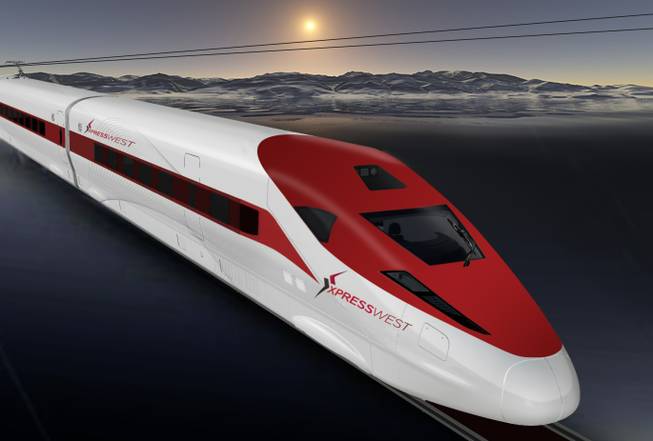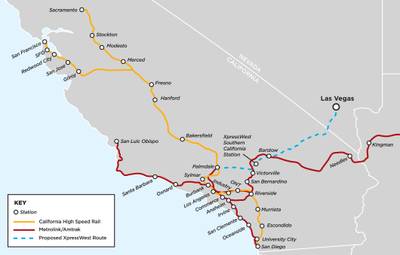
Courtesy of XpressWest
An artist’s rendering of a train on the XpressWest high-speed rail line.
Monday, Oct. 5, 2015 | 2 a.m.
XpressWest, a 230-mile high-speed rail project slated to stretch along the Interstate 15 corridor, could be just what Las Vegas needs to bring more weekend tourists from Los Angeles, but more importantly, it could mark a big moment in the growing relationship between Las Vegas and China.
The rail line, to be funded by a Chinese government-backed consortium, is just one of several high-profile projects in the valley that show the domestic benefits of a growing Chinese economy — and its perils.
“The project will be a landmark in overseas investment for the Chinese railway sector and serve as a model of international cooperation,” Yang Zhongmin, chairman of China Railway International, a newly formed Nevada firm owned by Chinese project backers, told Xinhua, a Chinese newspaper.
The state-owned project, which could break ground as soon as September 2016, is expected to cost at least $100 million.
It also is a chess move by China, which is looking to beat Japan in a race to export high-speed rail technology.
For China, the deal marks an opportunity to establish a foothold in the U.S. rail market. The largest bullet-train company in Japan had expressed interest in XpressWest several years ago but lost out. Just weeks after China won the Los Angeles-Las Vegas route, it also beat Japan in a months-long battle for an Indonesian contract to build a railway from Jakarta to Bandung.
To be fair, XpressWest is just one of a number of proposals to link Southern California and Southern Nevada that have come and gone since the 1970s. In the late 1990s, a proposal to connect Anaheim and Las Vegas with a magnetic levitation train was floated but went nowhere. In 1999, Amtrak proposed upgrading service to use high-speed Spanish-made Talgo trains, but the concept sputtered. Then there was the Z-Train, which was supposed to have gone into service in 2012. And a startup based in El Segundo, Calif., now is looking to bring Elon Musk’s Hyperloop to the route.
As Chinese capital takes a great leap outward, other projects funded by Chinese investors could take shape. Electric cars from Faraday Future, a project linked to Chinese tech conglomerate Leshi Internet Information and Technology, could roll off a production line in North Las Vegas, if a rumored tax incentive passes a special session of the Legislature that Gov. Brian Sandoval may call.
Sandoval also plans to embark on a trade mission to China in October, to visit Xi’an, Nanjiang, Shanghai and Beijing with governors of other Western states to drum up business in clean technology, taking advantage of the country’s recently announced cap-and-trade program to limit carbon emissions.
Chinese investment also has helped fund several new casinos in Las Vegas, including the Lucky Dragon, SLS Las Vegas (almost a quarter of the financing came from Chinese investment) and Resorts World Las Vegas, which broke ground in May with funding from the Genting Group, an Asian multinational corporation.
And of course, there’s Macau, the Chinese gaming hub, which has attracted gaming tycoons such as Steve Wynn and Sheldon Adelson.
But like a train, the economic ties run both ways. When China catches the flu, Las Vegas frequently gets sick too.
Most recently, after Chinese President Xi Jinping began an anticorruption crackdown, Macau’s economy plummeted. That in turn led to revenue declines for the Las Vegas companies invested there. The stock price of Las Vegas Sands, for instance, fell from more than $62 to less than $39 over the past year.


Join the Discussion:
Check this out for a full explanation of our conversion to the LiveFyre commenting system and instructions on how to sign up for an account.
Full comments policy